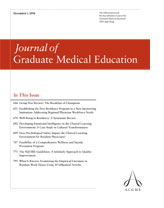 A journal has retracted a surgery study by researchers at Brown University after noticing it included data that was not intended for research purposes. (Incidentally, the data were collected by the publisher of the journal.)
A journal has retracted a surgery study by researchers at Brown University after noticing it included data that was not intended for research purposes. (Incidentally, the data were collected by the publisher of the journal.)
Ingrid Philbert, managing editor of the Journal of Graduate Medical Education — which published the paper — told Retraction Watch that senior staff at the publisher alerted the journal that they suspected the authors had used data from a confidential source:
This is a fairly new set of case log data, and as the collector [of] the data, the [Accreditation Council for Graduate Medical Education (ACGME)] gets to determine the use and it has decreed that this data be used solely for accreditation decisions.
Philbert said the journal asked the authors where they got the data:
We have asked the authors and they have not volunteered this information. We cannot compel them to disclose the source.
So the journal decided to retract the paper, Philbert told us:
The retraction was deemed necessary to protect the confidentiality of ACGME proprietary data used in accreditation activities.
We asked Philbert how the journal’s editors and reviewers missed the issue before publication, and were told:
The majority of case log data are public information. The data for some specialties, such as plastic surgery, are not, and editors will not always know this. It is a manual check of the information (http://www.acgme.org/Data-
Collection-Systems/Case-Logs- Statistical-Reports) and, in this instance, was an honest oversight. We have a new process in place to review articles that include case log data prior to publishing.
Here’s the retraction notice, published last month:
The above article has been retracted by agreement between the Journal‘s Editor-in-Chief, Gail M. Sullivan, MD, MPH, and the Journal, at the request of the Accreditation Council for Graduate Medical Education (ACGME).
The reason for the retraction is the inclusion of confidential ACGME plastic surgery case log data in a multi-specialty analysis of resident case volumes. Unlike the case log data for the other specialties in the analysis, the ACGME explicitly restricts the use of plastic surgery case log data to education and accreditation uses. The data would not have been available to the authors in a public, official, or appropriate manner, and is not intended for use in research.
The original paper, “Resident Exposure to Peripheral Nerve Surgical Procedures During Residency Training,” was published in May, 2016.
Philbert added:
Since the event, we have further strengthened the confidentiality warnings on the electronic and hard copies of the plastic surgery case log data.
Philbert — who is also senior vice president, department of field activities at the ACGME — noted that no investigation was carried out into the case because
it was not deemed necessary, as no data manipulation or fraud had occurred.
Philbert said no other action apart from the retraction was taken, noting that
the sole issue was the confidential nature of the plastic surgery data, and that the Journal offered the authors the opportunity to publish a “corrected” version of the article, with the confidential data removed, as the data for the other specialties are legitimate and offer valuable information to readers. The authors have informally indicated that they plan to avail themselves of this option.
We’ve reached out to first author Joseph Gil and last author Edward Akelman, both of whom are affiliated with Brown University.
We’ll update the post if we hear back.
Hat tip: Rolf Degen
Like Retraction Watch? Consider making a tax-deductible contribution to support our growth. You can also follow us on Twitter, like us on Facebook, add us to your RSS reader, sign up on our homepage for an email every time there’s a new post, or subscribe to our daily digest. Click here to review our Comments Policy. For a sneak peek at what we’re working on, click here.